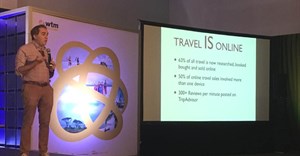Trending
Elections 2024
Touching the heart of your consumer
While various local and international speakers disagreed on the different loyalty methods that worked and even which measures to use, there was one reason they were all there: because reaching consumers in this overly cluttered brand new world means you have to deliver an experience.
The Disney Institute’s Sara Jones and Liz Bigham, vice president: branding of Jack Morton Worldwide, were keynote speakers on Thursday, 15 March 2007, along with global brand guru Martin Lindstrom and several local brand experts at the event organised by Exp. Marketing. Sponsors were Absa, Exp., Ukubona, Show-co and TBM. Bizcommunity.com was the official media partner to the event and used the opportunity to launch our push into Africa with our expanded country-by-country continent offering: www.www.bizcommunity.com.
Exp.’s Dave Boon, the champion of the Africa Experiential Summit which he hopes will be taken to other African cities as well next year, said brands created a special bond with consumers by “breaking into their hearts”.
Word of Mouth is king
Experiential marketing inspires advocacy and word-of-mouth buy-in by your customers. That’s the opinion of Liz Bigham, vice president of Jack Morton Worldwide. “Experiential marketing creates a fabulous job of creating breakthrough marketing. Breakthrough connection is authentic, meaningful and engages both the heart and mind,” says Bigham, who points out that 80% of word of mouth occurs face to face (source: Walter Carl, Northeastern University).
Bigham explained that advocacy is about inspiring people to market your brand on your behalf. Getting your customers to talk about your product and recommend it to their peers is a valuable marketing channel. “Earned opinions trump formal marketing.”
And if you’re not quite convinced, here’s some scary stats: quoting from Yankelovich (2005), Bigham pointed out that 76% of people do not believe that companies tell the truth in advertising; 68% trust other people “like themselves” - friends, family, peers - as a source of info; and 88% of people choose a brand solely or partly due to recommendations of friends, peers, family, according to Millward Brown studies; and furthermore, each person has 112 marketing relevant conversations per week (source: Talk Track, Keller Fay Group, 2006).
Bigham’s recommended reading for marketers wanting more is the breakthrough brand marketing book on the rise of consumer power, The Influentials.
Experiential engagement inspires advocacy and advocacy can be measured, Bigham assures. And what makes people talk? An experience…
In Jack Morton’s latest 2006 brand survey, Bigham says they proved this:
- 75% say participating in a face-to-face experience would be most likely to cause them to talk to others.
- 80% who had participated in past brand experiences reported they told others.
- Nine in 10 say that what they most want from marketers is information about products.
- Consumers cite direct experience with a brand as most likely to get info on the brand.
Bigham’s four steps to advocacy building are:
- Influencers: find the right people and understand what motivates them.
- Breakthrough connections: create experiences that engage and inspire them.
- Tools: give them ways to spread the message.
- Measurement: track engagement, impact and advocacy.
The Loyalty Connection
Disney’s Sara Jones spoke about The Loyalty Connection. Disney’s brand loyalty programme is based on the premise that maximum loyalty results from the connection of identity, value and relationships. Disney recognises that the greater the connection, the greater the loyalty, and that employees are customers, too. Disney unpacks loyalty as when the brand aligns with individual identity; when the experience delivers superior value; and when contacts build relationships:
- Identity explores the ways a company connects its brand with its customers and employees.
- Value identifies the link between what a company promises and what it delivers.
- Relationships examine the value of lifetime relationships with customers and employees.
People use products to send messages about themselves, explains Jones, because of: family history – a form of your personality - people do things because they feel a connection; and competence, through service delivery.
The Disney World service theme centers on the promise that Disney World creates happiness by providing the finest in entertainment to people of all ages.
“Part of the Disney success is our ability to create a believable world of dreams that appeals to all age groups. The kind of entertainment we create is meant to appeal to every member of the family,” said Jones, quoting Disney founder, Walt Disney.
She explained that a solid brand promise should:
- Enhance the perception of value.
- Stand for something.
- Not be copied easily.
- Attract employees who identify with the brand.
- Justify premium prices.
Your core brand strengths, she says, are:
- What you do well.
- What your organisation is famous for.
- What gives you a competitive advantage.
- Core strengths that allow you to create superior value for customers.
Jones emphasised that brands need to align their brand promise with their strengths, deliver on those strengths, value their employees and connect emotionally with their customers. “Loyalty is about that strong emotional buy in.”
The delight mirage
Brand radical, Dr Jannie Hofmeyer of Synovate, disagreed with the pat brand loyalty plan laid out by Disney and other brand specialists at the conference, saying that the new doctrine is to “exceed people’s expectations” not just deliver on them.
Referring to Disney’s presentation as ‘superb indoctrination’, he said: “This is the single most dangerous doctrine: the doctrine of customer delight.”
Why?
“Because nothing has the power to delight us forever! The problem is that we are constructed to become used to whatever you do, whatever the brand does… leading to habituation.”
Hofmeyer says chasing delight is being sucked into the marketing equivalent of a ‘black hole’ - like a dog chasing its tale. He lists further dangerous marketing indoctrination:
- Why do we think that just making people satisfied will get them to buy our brands?
- Why should we believe that asking people what they are about to do should reflect what they are doing?
- Why should we spend on our most valuable clients?
- You only need one number – there is no connection between business success and the net promoters score. The measurement is rubbish, he says, as a recent global Journal of Marketing article states.
Hofmeyer points out that the human capacity is to form bonds, even when dissatisfied: “that is the universal truth of commitment”. So, in order to get a consumer to commit to your brand, Hofmeyer recommends the following:
- Direct Experience – this is the most important contact!
- Word of Mouth!
- Marketers efforts: advertising is just ONE kind of effort!





















